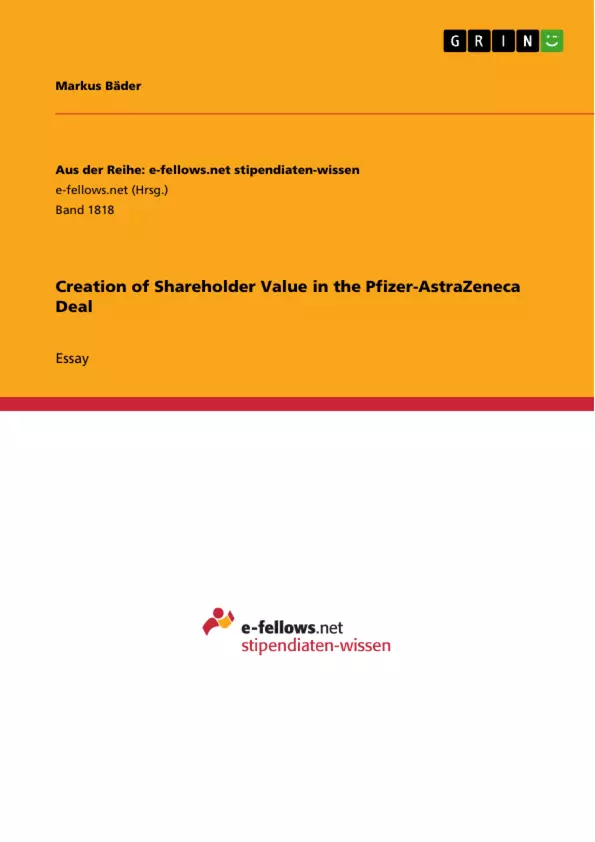The pharmaceutical sector has experienced a year of heavy consolidations, with a record breaking M&A volume of $250bn in 2014. From a shareholder perspective this should, however, cause serious concern as the deals very rarely maximise the owner’s wealth. An illustration of this is the failed acquisition of AstraZeneca by US pharmaceutical giant Pfizer in spring 2014, when the British, despite strong strategic synergies, decided to reject an $117bn takeover bid, due to an insufficient price-offer.
This essay is going to critically evaluate the concepts of shareholder wealth creation, in light of appropriate evaluation methods for bids and the influence of capital structure. It will be concluded that information asymmetry was one of the core issues in the case, as both parties ultimately misestimated potential synergies. Moreover, it is argued that irrational decisions, made by executive, can significantly impact and eventually destroy shareholder value.
Inhaltsverzeichnis (Table of Contents)
- Creation of Shareholder Value in the Pfizer-AstraZeneca Deal
- Valuation of Bids
- Capital Structure
- Value-Creation in M&As
- Conclusion
Zielsetzung und Themenschwerpunkte (Objectives and Key Themes)
This essay critically evaluates the concepts of shareholder wealth creation in light of appropriate evaluation methods for bids and the influence of capital structure. It analyses the failed acquisition of AstraZeneca by Pfizer in 2014, highlighting the importance of accurate valuation and potential pitfalls associated with information asymmetry and irrational decision-making.
- Shareholder value creation in mergers and acquisitions
- Valuation methods for takeover bids
- The role of capital structure in M&As
- Information asymmetry and its impact on deal outcomes
- Irrational decision-making and its potential to destroy shareholder value
Zusammenfassung der Kapitel (Chapter Summaries)
- Creation of Shareholder Value in the Pfizer-AstraZeneca Deal: This chapter introduces the context of the Pfizer-AstraZeneca deal, highlighting the trend of consolidation in the pharmaceutical sector and the potential for shareholder value creation in M&As. It also discusses the failed acquisition attempt and the key factors that contributed to its failure.
- Valuation of Bids: This chapter explores different valuation approaches used to assess takeover bids, including market-based, income-based, and net-asset valuation methods. It examines the strengths and weaknesses of each method, highlighting the challenges associated with accurate forecasting of future earnings and estimating a firm's discount rate.
- Capital Structure: This chapter delves into the role of capital structure in mergers and acquisitions, discussing how capital structure decisions can impact shareholder value creation. It explores different capital structure theories, such as the Pecking Order Theory and the Trade-off Theory, and their relevance in the context of M&As.
- Value-Creation in M&As: This chapter investigates the factors that contribute to value creation in mergers and acquisitions, focusing on the importance of strategic synergies, operational efficiencies, and market power. It examines how information asymmetry and irrational decision-making can negatively impact the potential for value creation.
Schlüsselwörter (Keywords)
This essay focuses on the concepts of shareholder value creation, valuation methods, capital structure, information asymmetry, irrational decision-making, mergers and acquisitions, pharmaceutical industry, Pfizer, AstraZeneca, and the failed acquisition attempt of 2014.
- Citar trabajo
- Markus Bäder (Autor), 2015, Creation of Shareholder Value in the Pfizer-AstraZeneca Deal, Múnich, GRIN Verlag, https://www.grin.com/document/323354



